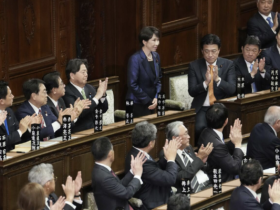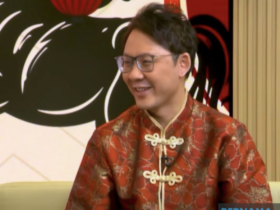BEIJING, July 24 – Chinese Vice Premier He Lifeng will be in Sweden from July 27 to 30 for economic and trade talks with the US upon mutual agreement, China’s Ministry of Commerce announced on Wednesday.
Following the important consensus reached during the phone talks between the two heads of state on June 5, the two sides will leverage the role of the China-US economic and trade consultation mechanism and continue to engage in consultations on economic and trade issues of mutual concern based on the principle of mutual respect, peaceful coexistence and win-win cooperation, said a spokesperson with the ministry, the Xinhua News Agency reported.
In May, China and the US released a joint statement on the China-US Economic and Trade Meeting in Geneva and the parties announced the establishment of a mechanism to continue discussions about economic and trade relations, according to Xinhua.
In June, the first meeting of the China-US economic and trade consultation mechanism was held in London, leading to new progress in addressing each other’s economic and trade concerns, China Central Television reported.
“The fact that China and the US can hold three economic and trade talks within two and a half months indicates that both sides are willing to maintain communication and strengthen dialogue. The previous two talks have each produced new outcomes, showing a consensus on achieving concrete results, which are all positive signals,” He Weiwen, a senior fellow at the Center for China and Globalization, told the Global Times on Wednesday.
“Talks and engagement are always better than confrontation, as they will help foster a more predictable environment for companies from the two countries as well as other countries,” said Gao Lingyun, a research fellow at the Institute of World Economics and Politics of the Chinese Academy of Social Sciences.
He Weiwen noted that the new round of talks is crucial for building on the outcomes of the previous two, further refining the framework of China-US agreements, and striving for more concrete results to advance comprehensive economic and trade cooperation between the two major economies.
Multilateral rules
China and the United States on May 12 released a joint statement on China-US Economic and Trade Meeting in Geneva, stating a 90-day pause on most of tariffs, which is scheduled to expire in August.
US Treasury Secretary Scott Bessent said on Tuesday local times he will meet his Chinese counterparts in Stockholm next week for their third round of trade talks aimed at extending a tariff truce and widening the discussions.
In response to Bessent’s claim that the negotiations may take on a broader array of topics, including China’s purchase of oil from Russia and Iran,
Guo Jiakun, a spokesperson from China’s Foreign Ministry, said at a press conference on Wednesday that on economic and trade issues, China’s position is consistent and clear.
We hope the US will work with China to act on the important common understandings reached by the two presidents in their phone conversation, make good use of the consultation mechanism and engage in communication and dialogue on the basis of equality, respect and mutual benefit, so that there will be more consensus and cooperation and less misperception, and the bilateral relations can achieve steady, sound and sustainable development, Guo noted.
The US Commerce Department last week announced it will impose preliminary anti-dumping taxes of over 90 percent on a kind of graphite imported from China. The Chinese Foreign Ministry stressed that China-US economic ties benefit both sides, while urging the US side to abide by the rules of the market economy and keep trade and economic ties sound and stable.
Normal trade and economic cooperation benefits both sides, Gao said, noting that the US business community, academics and political figures need greater efforts to inject common sense into the China-bashing environment in the US.
Spillover effects of tariff
According to CNBC, US Commerce Secretary Howard Lutnick said on Sunday that August 1 is the deadline for countries to begin paying tariffs to the US.
Agreements should be based on multilateral trade rules, equality, mutual respect and mutual benefit, He Weiwen said.
A recent report released by the US-China Business Council shows that 82 percent of US companies in China reported a profit. Many say uncertainties in China-US relations and tariffs are their top concerns, but the Chinese market remains vital.
The International Monetary Fund (IMF) released a report on July 22 local time, warning that the US administration’s move to impose import tariffs on nearly all of its trading partners “would have significant macroeconomic effects.”
The report noted that the tariffs are likely to reduce global demand in the short term, leading to “a negative supply shock (especially for the imposing countries), and add to inflationary pressures through rising import prices.” Moreover, the uncertainty surrounding the tariffs could undermine consumer and business confidence and increase volatility in financial markets.
The report noted that the US tariff hikes could prompt other countries to respond by raising their own trade barriers to address widening imbalances, further deepening geoeconomic fragmentation. Such a trend would inflict lasting damage on the global economy.
The Asian Development Bank (ADB) has also lowered its growth forecasts for economies in developing Asia and the Pacific this year and next year. The downgrades are driven by expectations of reduced exports amid higher US tariffs and global trade uncertainty, as well as weaker domestic demand.
ADB forecasts the region’s economies will grow by 4.7 percent this year, a 0.2 percentage point decline from the projection issued in April. The forecast for next year has been lowered to 4.6 percent from 4.7 percent, according to the Asian Development Outlook (ADO) July 2025 released on Wednesday.
“Tariffs primarily affect trade, while the uncertainty they create has a particularly severe impact on investment, both of which are destructive to the global economy,” He Weiwen warned.
China has consistently been a practitioner of multilateralism and hopes that the US will adopt a responsible attitude as a major power, working together with China to uphold free trade and inject vitality into global progress through cooperation, Gao noted.






















Leave a Reply